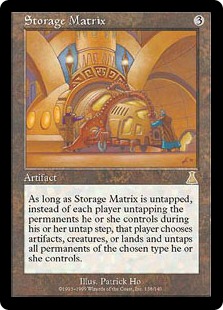Let’s face it: Magic is a complex and complicated game. It has thousands upon thousands of cards, over 200 pages of rules, a seemingly infinite number of deck permutations, and a randomness factor that guarantees few games feel exactly the same.
That is, unless you play with the type of people who want every game to behave the same way.
These people – often competitive duelists – usually have finely tuned decks that hinge upon doing a single thing exceedingly well. They have min-maxed the deck to all hell, and they usually have an advanced knowledge of the game’s more nuanced rules. They thrive on ensuring that every game of theirs is fast, short, and as repetitive as possible.
If that’s their preferred style of playing Magic, all the power to them. It isn’t my style, but I understand the appeal. I prefer my games to be longer, more unorthodox, and for them to have the kind of unpredictability you can only get from three or more players. Chalk it up to being around Magic for as long as I have (my vigentennial is just a couple months away), but I need that mystery of the unknown to keep my interest going. I’ve done the hard-slinging dueling, and I learned very early that the Constructed scene was not my bag. It’s why I often build wonky decks, and it’s especially why I enjoy multiplayer Magic like Commander.
That said, one thing I try not to do is to use my experience with the game as part of a deck or combo idea. Any time I see any trick that involves the phrase “while maintaining priority” – retaining the right to respond to your own spell or ability before an opponent – I cringe. If someone is relying on a game rule that 99.5% of the time is irrelevant and unknown to other players, I see that more as taking advantage of them than being really clever.
Rather, I have a strong desire to explain to people I’m playing with how rules work, even if the result goes against me. Magic is complicated enough, and above all it should be fun. No one wants to lose because they aren’t aware a rule works (or doesn’t work) a certain way. I make a habit of annually renewing my Rules Advisor judge cert more as a formality, but it underlines the desire to teach people how the game functions.
In addition to the rules, though, I also try to impart a few tactics to beginner and intermediate skilled players with respect to multiplayer games. These include examples such as:
- Do as much as you can at the end of someone else’s turn, preferably right before yours.
- Never let the results of a previous game influence your decisions in the next one.
- Almost always pay 1 for Rhystic Study; giving someone free card draw only hurts you in the long run.
- Appearances can be deceiving. The most powerful player may not be who it seems. Be especially wary of the person who appears to be the second strongest.
- Chances are anyone offering to help you is positioning themselves to backstab you later. Feel free to accept their assistance, but be prepared for their sudden but inevitable betrayal.
- Force opponents to make decisions on your terms rather than theirs.
It’s that last tidbit that brings us here today. Normally, players wait until they have the optimum opportunity to cast spells, attack players, and cause general mayhem. One such answer to that is to simply not give them the choice.
Today we have: Storage Matrix

Name: Storage Matrix
Edition: Urza’s Destiny / Ninth Edition
Rarity: Rare
Focus: Board Control
Highlights: Remarkably straightforward, Storage Matrix compels players to choose what they want access to: artifacts, creatures, or land. Arguably, though, most of the time players only worry about creatures and land.
If a player opts to attack and use mana in the same turn, Storage Matrix ensures that they cannot reset both their following turn. The result is to either leave themselves open to combat retaliation by not untapping their creatures, or having less mana in exchange for having blockers.
The more common approach is for players to only do one thing as to avoid Storage Matrix’s effect (similar to how Angelic Arbiter works. And that’s a perfectly acceptable result as well. If a player attacks, the cost of using combat tricks rises drastically. If they want to cast spells and abilities on their turn, the odds of them attack drop substantially.
Storage Matrix may not be a bombshell card in the later stages of a Commander game, but it still can make a notable impact all the same. On the one hand, Storage Matrix affects everyone equally, though some won’t like working around such a restriction in the early to mid stages of a game. On the other hand, these restrictions alter the flow of the game. It makes trying to do multiple things each turn much riskier, and / or it causes players to become slightly more predictable in what they are going to do.
Storage Matrix isn’t a card that will single-handedly win you a Commander game, but it does change up the status quo by throwing most player’s turn structure a bit off balance. Hopefully that means it tips the balance in your favor.
Keep an eye out for us to be regularly featuring other more accessible-but-worth-it Commander cards going forward. In the meantime, we’ll keep the light on for you.
![]()
You can discuss this article over on our social media!
Do you have a particular Commander card to suggest for us to shine a future Spotlight on? You can send suggestions to ryan@cardboardrepublic.com
